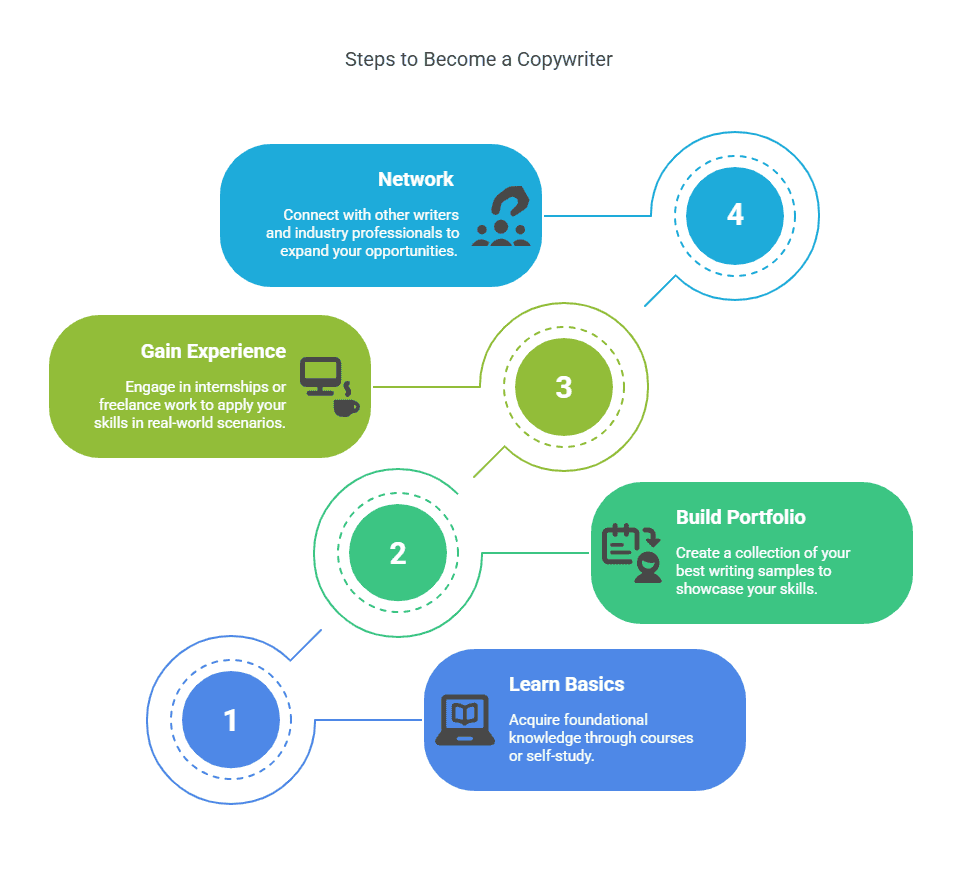With over 4,930,000 copywriter jobs available in the United States, the demand for skilled copywriters has never been higher. As Jonathan Trueman, a seasoned professional in the field, notes, “Copywriting is not just about writing; it’s about crafting messages that resonate and convert.” Whether you’re a seasoned professional or just starting out, understanding the landscape of copywriter jobs is crucial for success. From remote opportunities to traditional in-house roles, the possibilities are vast, and the right strategy can make all the difference in your job search and career growth.
In this guide, we’ll delve into the ins and outs of copywriter jobs, covering everything from how to find the best positions to tips for acing your interviews and building a standout portfolio. We’ll also explore the future of remote work and how it’s shaping the copywriting industry. By the end of this guide, you’ll be equipped with the knowledge and tools needed to navigate the competitive world of copywriting with confidence.
Job Search and Application for Copywriter Positions in the US
Searching for copywriter jobs in the US can be a daunting task, but with the right strategies, you can stand out in a competitive market. Here’s a step-by-step guide to help you find and apply for copywriter positions effectively.
Top Job Boards for Copywriter Positions
Here are some of the best platforms to find copywriter jobs:
These platforms offer a wide range of opportunities, from remote positions to in-house roles.
Crafting a Winning Copywriter Resume and Cover Letter
Your resume and cover letter are your first impressions to potential employers. These documents serve as a snapshot of your skills, qualifications, and experiences, providing recruiters with a quick overview of your professional background. It is essential to tailor your resume and cover letter to the specific job you are applying for, highlighting relevant achievements and showcasing how your expertise aligns with the job requirements. For example, including quantifiable results or specific projects you have worked on can make your application more compelling and demonstrate your capabilities effectively. Remember, a well-crafted resume and cover letter can significantly increase your chances of landing an interview and ultimately securing the job opportunity.
Here are some tips to make them stand out:
- Highlight your writing skills and experience.
- Include links to your portfolio or previous work.
- Customize your cover letter for each application.
Preparing for Copywriter Job Interviews
Preparing for copywriter job interviews involves understanding common questions and showcasing your skills effectively. This includes researching the company and its marketing strategies, familiarizing yourself with industry trends and best practices, and practicing your writing skills by creating sample pieces tailored to the company’s brand voice. Additionally, being able to demonstrate your creativity, attention to detail, and ability to meet deadlines will help you stand out during the interview process. Remember to also prepare to discuss your relevant experience, such as previous writing projects, campaigns you have worked on, and any specific results you have achieved through your copywriting efforts.
Here are some tips:
- Practice answering behavioral questions.
- Be ready to discuss your portfolio and previous projects.
- Research the company and their brand voice.
Career Opportunities and Benefits as a Copywriter

A career as a copywriter offers numerous opportunities and benefits. Copywriters have the chance to work across various industries such as advertising, marketing, public relations, and digital media. They can create content for diverse platforms, including websites, social media, print materials, and more. Additionally, copywriters often have the flexibility to work as freelancers, allowing them to choose their projects and work remotely. This career path also provides opportunities for growth and specialization, such as becoming a content strategist, UX writer, or creative director. Copywriters can develop a versatile skill set that includes writing, editing, research, and creative thinking, making them valuable assets in today’s competitive job market.
Here are some of the key advantages:
- Flexible work arrangements, including remote options.
- Opportunities to work with diverse industries and brands.
- Continuous growth and learning in a dynamic field.
What Does a Copywriter Do? Key Responsibilities and Skills
A copywriter’s primary responsibility is to create compelling content that drives engagement and conversions. This involves crafting persuasive language that resonates with the target audience, leading them to take desired actions such as making a purchase, signing up for a newsletter, or sharing the content on social media. Copywriters must have a deep understanding of the brand they are writing for, as well as the products or services being promoted. By conducting thorough research and utilizing effective storytelling techniques, copywriters can create content that not only attracts attention but also motivates readers to engage with the brand.
Key skills include:
- Strong writing and editing abilities.
- Understanding of target audiences and brand voice.
- Familiarity with SEO and content management systems.
Benefits of Being a Copywriter: Flexibility, Creativity, and More
Being a copywriter provides a unique blend of flexibility and creativity. This dynamic role allows professionals to engage in a diverse range of projects, such as crafting engaging blog posts, developing compelling marketing campaigns, and creating impactful social media content. Copywriters have the freedom to choose between working remotely, offering flexibility in managing their schedules, or working in-house to collaborate closely with a team. This versatility enables copywriters to adapt to different work environments and project requirements, fostering continuous growth and learning opportunities in the field. Additionally, the ability to work on various types of content allows copywriters to hone their skills and explore different writing styles, contributing to their professional development and expertise.
How to Become a Copywriter: A Step-by-Step Guide
Becoming a copywriter involves developing your writing skills, building a portfolio, and gaining experience.
Here’s a step-by-step guide to help you get started:
- Learn the basics of copywriting through courses or self-study.
- Build a portfolio showcasing your writing skills.
- Gain experience through internships or freelance work.
- Network with other writers and industry professionals.

Education and Training for Aspiring Copywriters
Although formal education is not mandatory, possessing a background in writing, marketing, or communications can significantly enhance one’s skills and abilities in various professional settings. For instance, individuals with a writing background may excel in creating compelling content for marketing campaigns or effectively communicating ideas to a diverse audience. Similarly, those with a marketing background can leverage their knowledge to develop strategic communication plans that resonate with target demographics. Furthermore, individuals with a communications background may possess strong interpersonal skills that are valuable in building relationships and engaging with stakeholders effectively. Ultimately, while formal education is not a prerequisite, having expertise in these areas can provide a competitive advantage and open up diverse opportunities for career growth and development.
Here are some recommended resources:
- Courses on platforms like Coursera or Udemy.
- Joining writing communities or workshops.
- Reading books on copywriting and marketing.
Building a Copywriter Portfolio: Tips for New Copywriters
Having a well-organized and visually appealing portfolio is crucial for making a strong impression on potential employers or clients. A portfolio showcases a person’s skills, expertise, and accomplishments in a tangible and accessible format. It provides concrete examples of past work, demonstrating the quality and proficiency of the individual. For example, a graphic designer’s portfolio may include a range of projects such as logo designs, branding materials, and website layouts to highlight their creativity and technical abilities. In the case of a writer, their portfolio might feature published articles, blog posts, and sample chapters to showcase their writing style and versatility. Ultimately, a well-crafted portfolio serves as a powerful tool for effectively communicating one’s capabilities and attracting opportunities in the competitive job market or client acquisition process.
Here are some tips for building a strong portfolio:
- Include a variety of writing samples.
- Highlight any previous work or projects.
- Make it easy to navigate and visually appealing.
Gaining Experience: Freelancing, Internships, and Entry-Level Roles
Gaining experience is crucial for building a successful copywriting career. Consider starting with freelance work or internships to gain practical experience. Engaging in freelance work allows aspiring copywriters to work on various projects for different clients, honing their skills in crafting compelling and effective copy. By taking on internships with established advertising agencies or marketing firms, individuals can learn from experienced professionals in the field, gaining valuable insights and industry knowledge. These opportunities provide hands-on experience and networking possibilities that can open doors to future career prospects in copywriting.
Remote Copywriter Jobs: Worldwide Opportunities
Remote copywriter jobs offer flexibility and the opportunity to work with clients from around the world. Here are some tips for finding remote opportunities:
- Use remote job boards like Write Remotely, Remote.co or FlexJobs.
- Network with other remote workers and join online communities.
- Ensure your portfolio and resume are optimized for remote roles.
Best Platforms for Finding Remote Copywriter Jobs
Here are some of the best platforms for finding remote copywriter jobs:
Success Tips for Remote Copywriters
Success as a remote copywriter requires discipline and effective time management to meet deadlines consistently and deliver high-quality content. Remote copywriters need to stay organized to juggle multiple projects efficiently while working independently. This involves creating a structured work schedule, setting daily goals, and minimizing distractions to maintain focus. Utilizing productivity tools such as task management apps or time tracking software can also help remote copywriters optimize their workflow and enhance productivity. Additionally, effective time management allows remote copywriters to allocate sufficient time for research, writing, editing, and revisions, ensuring that their content meets clients’ requirements and maintains a high standard of quality.
Here are some tips:
- Set a regular work schedule.
- Stay in communication with clients and team members.
- Continuously improve your skills and knowledge.
Copywriter Salary Per Hour: What You Should Know
Copywriter salaries can vary based on experience, location, and industry. Factors such as the level of education, specialized skills, and certifications can also influence salary levels. For example, a copywriter with a bachelor’s degree and additional training in digital marketing may command a higher salary than someone with only a high school diploma. Location plays a significant role in determining salaries, with copywriters in major cities or regions with a high cost of living typically earning more than those in rural areas. Additionally, copywriters working in industries such as advertising, technology, or healthcare tend to earn higher salaries compared to those in non-profit organizations or government agencies.
Here are some insights into hourly rates and compensation:
- Average hourly rate for copywriters in the US: $40-$100 per hour.
- Factors influencing salary: experience, location, industry, and project complexity.
- Negotiation tips: Highlight your value, research market rates, and be confident.
Factors That Influence Copywriter Hourly Rates
Several factors influence copywriter hourly rates, including:
- Experience: More experienced writers can charge higher rates.
- Location: Rates may vary based on the cost of living in different areas.
- Industry: Different industries have different pay scales.
- Project Complexity: More complex projects may command higher rates.
Negotiating Your Rate: Tips for Copywriters
Negotiating your rate as a copywriter requires confidence and a clear understanding of your value. Here are some tips:
- Research market rates to determine a fair range.
- Highlight your skills and experience.
- Be open to negotiation but know your minimum acceptable rate.
Conclusion
Copywriting is a dynamic and rewarding field with endless opportunities. Whether you’re just starting out or looking to advance your career, understanding the job search process, building a strong portfolio, and staying informed about industry trends can help you succeed. With the right strategies and a bit of determination, you can thrive as a copywriter in today’s competitive market.
FAQs
What does a copywriter exactly do?
A copywriter creates written content to promote a product, service, or brand. This can include blog posts, advertisements, website content, and more.
Can you make $10,000 a month with copywriting?
Yes, experienced copywriters can earn $10,000 a month or more, especially in high-demand industries or with freelance rates.
What is copywriting for a job?
Copywriting is the process of writing persuasive and engaging content to market a product, service, or brand.
What qualifications are needed to be a copywriter?
While formal qualifications are not always required, strong writing skills, a portfolio of work, and understanding of marketing principles are essential.
What does a copywriter do?
A copywriter writes content to promote products, services, or brands. This can include blog posts, advertisements, email campaigns, and more.
How do I become a copywriter?
Becoming a copywriter involves developing your writing skills, building a portfolio, and gaining experience through internships or freelance work.
What jobs are associated with copywriting?
Copywriting is a versatile field with opportunities in marketing, advertising, content creation, and more. Related roles include content writer, marketing specialist, and creative director.
How many copywriter jobs are there in the United States?
There are over 4,930,000 copywriter jobs in the United States, with opportunities in both traditional and remote roles.
How do I find a copywriter job?
Use job boards, networking, and portfolio showcasing to find copywriter jobs. Tailor your resume and cover letter for each application and be prepared for interviews.
Is a copywriter a good career choice?
Yes, copywriting can be a rewarding and lucrative career, offering flexibility, creative freedom, and opportunities for growth in a dynamic field.

 Owner of Write Remotely. Connecting businesses with talented writers and empowering remote work.
Owner of Write Remotely. Connecting businesses with talented writers and empowering remote work. 

